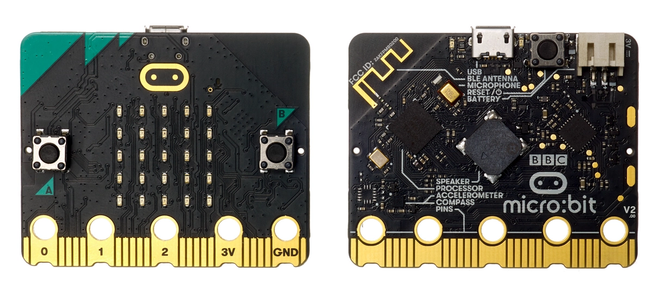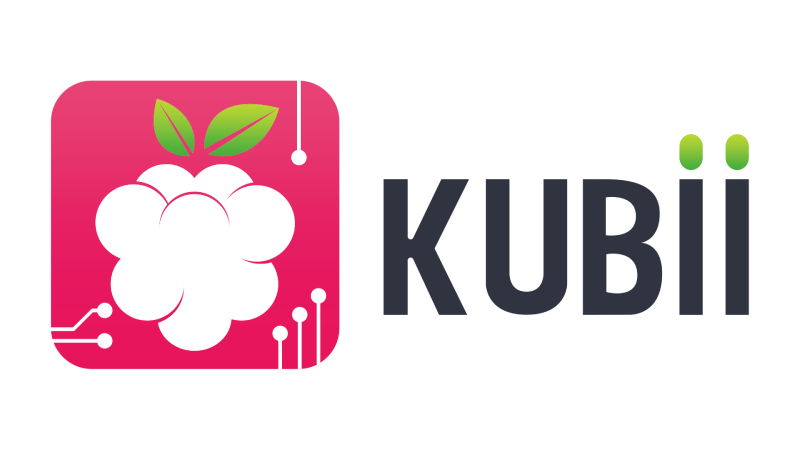WHAT IS MICRO:BIT ?
Board
Micro:bit is a microcontroller that can be programmed with a simple code language to create games and animations or to control your hardware.
The BBC Micro:bit board is composed of:
- 25 programmable LEDs to write texts or create images
- 2 buttons to trigger a code on the device
- Connection pins on the edge composed of 25 connectors to connect to other components or sensors
- A light sensor to detect the ambient light
- A temperature sensor to measure the temperature of the device
- An accelerometer to detect movements such as shaking, falling or tilting
- A compass to know the indicated direction
- A radio connection to communicate wirelessly between Micro:bit and create games
- A Bluetooth connection to control tablets and phones or send code to the Micro:bit. Applications such as Swift Playgrounds and Scratch can use the Micro:bit via Bluetooth
- A USB interface to connect the Micro:bit to the computer
All these elements are individually programmable.

Foundation
The MicroBit Foundation is a UK-based organization that aims to promote STEM (Science, Technology, Engineering and Mathematics) education in schools. It supports many educational programs internationally and distributes educational materials with the philosophy of making code more fun and easy to use. The Foundation has many partners, including Microsoft, who are all committed to helping the Micro:Bit Foundation achieve its goal of inspiring children around the world to code.
Made famous by its interactive coding lessons for young children, it has deployed many tools such as project ideas, a guide to get started quickly and editors such as Python Editor to learn the basics of Python and MakeCode to discover JavaScript. Code from your phone! You can also send code via the Micro:bit applications available on Android and iOS.
Micro:bit is the perfect first computing experience for high school students: an affordable and highly scalable device that promotes creative coding, problem solving and computational thinking!
The Foundation has chosen Kubii as its official reseller for France, Spain and Italy.

Code editor
The Micro:bit BBC Foundation is making its code editor available for use from high school age! This version introduces new features perfectly adapted to different needs and learning levels:
- The ability to drag and drop code snippets to program without knowing how to write!
- Semi-automatic input to easily learn the basics of the lexicon and the Python language
- The highlighting of errors with a debugging aid to be able to correct and improve
- A compiler / code reader to have a live feedback on the progress and operation of the code
- The possibility of checking and correcting automatically the code to succeed in spite of everything!
This code editor is a must for teachers and beginners who want to have a simple, fun and complete solution to make accessible and instructive projects!
This Micro:bit platform and its block language allow you to focus on learning algorithmic principles and developing analytical and problem-solving skills: ideal for classrooms!
Discover the Micro:bit Python code editor
Education
The Micro:bit educational foundation shares its efforts between 4 missions:
- To inspire children, especially disadvantaged groups such as girls
- Making the Micro:bit card easier and more efficient
- Organize courses and exercises in collaboration with educators
- Supporting communities of educators and partners
In short, Micro:bit's primary mission is to make digital technologies more accessible in the education sector. And these efforts are paying off! In fact, Micro:bit regularly publishes the results of university research measuring the impact of their mission. For example, in Denmark, 1,447 schools tested Micro:bit cards with their students and 95% of them found that students found it easier to code after using a BBC micro:bit card.
Do you work in the education sector and would you like to support Micro:bit? Discover the Micro:bit kit! This kit is aimed at teachers and offers a pack of 10 BBC micro:bit cards with cables, batteries and start-up guides.


 Français
Français
 Español
Español
 Italiano
Italiano
 Deutsch
Deutsch
 Portugais
Portugais